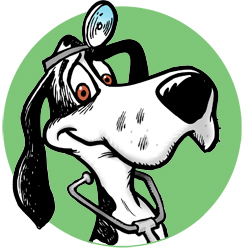Do you remember that beloved children’s party game Pin the Tail on the Donkey? Since I have no children, I have no idea if that game is even played anymore, but I played it.
It was fun and silly with very few rules.
All that it entailed (pun intended) was donning a blindfold, getting spun around and then staggering around towards where you thought the donkey picture was hanging.
Once you felt you had arrived at the wall, it was literally a stab in the dark when you pinned the paper tail onto the donkey. Closest to the right spot won the game.
Now that another “hard date” for the ICD-10 mandate has been set, October 1, 2015, there is a flurry of articles, online course ads, payer publications flooding my inbox and I bet yours too. I am no longer an active medical biller, but those of you who are along with clinical staff, etc. should pay attention to some of those correspondences. Converting your familiar, comfortable ICD-9 codes to ICD-10 shouldn’t be and can’t be like pinning that tail on the donkey. Being only close to the right spot might still negatively impact your revenue. You need to be spot on.

So how do you do it?
You make sure you are prepared.
Prevent the staggering around in the dark and take an online course, attend a webinar, buy a book and read it.
Then take that knowledge and practice it.

Iridium Suite Revenue Cycle Management system is already ICD-10 compliant and has an integrated ICD-9 to 10 crosswalk. Contact us for a free demo.
Crosswalk programs offer an additional option in assisting billers in converting ICD-9 codes to ICD-10, but since there are many more version 10 codes, there is not a simple one to one ratio.
 It can be likened to another childhood game Telephone. One person whispers a message to another, which is passed through a line of people.
It can be likened to another childhood game Telephone. One person whispers a message to another, which is passed through a line of people.
When the story is told at the end of the line, often time there are humorous discrepancies from the original story. The erred information stems from the retellings.
With the potential for lost revenue on the line, there is nothing humorous about the possibility of inaccurate diagnosis coding.
Researchers at the University of Illinois Chicagostudied the conversion results of 120 ICD-9 codes from the Illinois Medicaid database used by hematology-oncology physicians and the 100 most-used codes from the University of Illinois Cancer Center. They determined that by relying solely on the software, there was an approximate 8% loss of information in the Medicaid codes alone. Read more here.
Using a crosswalk program might get the tail on the donkey, but who knows where.

Make sure your claims are on target by utilizing all the available tools and always refer to the medical documentation to determine the most accurate diagnosis coding for your services.


